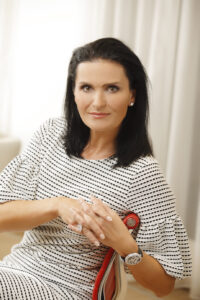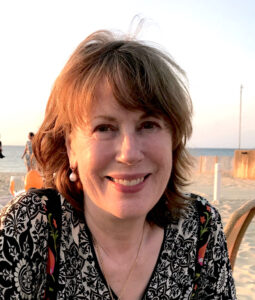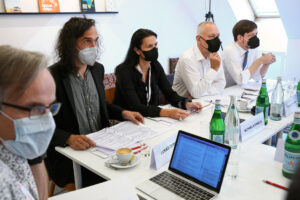HAVEL CONVERSATION: Michaela Bakala in discussion with Dr. Marilyn Wyatt
Dr. Marilyn Wyatt, VHLF board member, recently talked to Michaela Bakala, a philanthropist well-known for her leadership of the Bakala Foundation, Fondation Zdenek et Michaela Bakala, Aspen Institute Central Europe and the Václav Havel Library.
Their conversation that took place on Zoom on November 1, 2021, focused on the state of democracy in the Czech Republic and internationally, the character of Václav Havel and his legacy, independent media, supporting talented aspiring students, and belief in the upcoming generation of young leaders. The interview was shortened for length.

Michaela Bakala is an entrepreneur and manager, but most of all, a mother and philanthropist. The causes dearest to her heart are those related to education, the development of democratic society, and women’s role in society. She is a chair of the board of the Bakala Foundation in the Czechia and the Fondation Zdenek et Michaela Bakala in Switzerland. Both of them focus on education and operate scholarship programs for talented students. Together with her husband, she became involved in establishing a Central European branch of Aspen Institute. She is a vice chair of the Václav Havel Library board, and also a proud patron of the TOP Czech Women Awards project.

Marilyn Wyatt is a former diplomat who served as cultural affairs officer at the U.S. Embassy in Prague from 1992 to 1994. Since 2000 she has worked as a consultant in governance to civil society sectors around the world and, more recently, as an editor specializing in development and foreign affairs. She is a vice chair of the VHLF board.
Tell us about the origin of the Bakala Foundation. Your website states that one of its missions is to support “the cause of democracy and all that makes freedom possible.” This is a statement that Vaclav Havel himself could have made. What do you mean by this?
Zdenek and I are of the generation of people who experienced the amazing moment when the fragile democracy of the newly independent Czechoslovakia was born. So, the values of democracy and freedom became deeply ingrained in us. We could see that the communist regime wasn’t allowing us to live our lives, our society was sick, and we couldn’t support such a system. It was based on propaganda, oppression, and hypocrisy; we wanted freedom.
To live free takes courage–the courage to take risks, speak up, and act. Vaclav Havel said that “with freedom comes responsibility,” and we agree. True democracy is based on respect for others, the law, justice, and truth. Freedom gives us choices, and those choices come hand in hand with the responsibility to show concern for others and for the consequences of our actions. To keep the freedoms we have, we must have the courage to stand up for them. Not everyone understands that today. Some people try to enjoy the benefits of democracy without properly handling its responsibilities.
How has Havel influenced your work and values?
Vaclav Havel became a part of my life several years before the autumn of 1989. As a young high school student, I was asked by people associated with the Protestant church where my father served as a priest to make copies of Charter 77 and other texts by Havel and his fellow dissidents. I learned a lot from those texts. Havel was an inspiration to listen to, follow, and support. I still remember his first speech as president on New Year’s Day 1990.
He was a thinker and writer, gifted at delivering the right words, at the right time, and in the right way. I still admire how he could explain a critical and complicated issue with a simple message that we quickly understood and accepted. It wouldn’t have worked had he not been genuine. But that’s who he was. To us, Vaclav Havel represented all of our values and dreams. He felt a responsibility not only toward himself and our country but the whole world—he truly wanted to contribute to a better world. Havel believed in cooperation among countries, active civic societies, a strong European Union, free media, humanity, and helping the environment. He often thought about the future.
For me, a hero of the same caliber was Nelson Mandela. The political development of South Africa from a very oppressive apartheid system to democracy, freedom and racial justice is very moving. Now they have free media, civic institutions, and stable businesses. To end apartheid and build a positive future, South Africa needed leaders who could convince people not to give in to rage and end up in another civil war. F. W. de Klerk was also noteworthy for his work in peacefully bringing Mandela to power. His death is a loss we’ve felt deeply. We were honored to write a tribute to his well-lived life.
Today South Africa is having severe problems. First, former President Zuma was accused of corruption, and now it seems that President Ramaphosa is not handling the situation as forcefully as some would like. Things have changed in the Czech Republic as well. To what extent is the optimism, idealism, and hope for the future that you’ve just described still alive today?
Sometimes, when a democracy goes through challenging times, it can be easy to doubt the benefits of staying the course. People ask if we should do things differently or if we’re living in a post-democratic or post-truth era. I disagree with this kind of thinking, and it concerns me to see efforts to dismantle the democratic system. It’s scary to see international alliances challenged and threatened, to see that facts and science no longer matter. So many things that we’ve learned and experienced are no longer accepted as general knowledge. So, in many ways, I feel that we’re going backward. It’s costly and risky for society if an entire generation takes a step backward. We could wind up losing valuable time.
Yes, we’re going through a difficult period right now. But at some point, we need to pick up and carry on. We had an enormously valuable opportunity. I’m of the generation that benefitted, and I seized upon it as something on which to build upon.
You’ve mentioned that hypocrisy undermined society during the communist period. I wonder if we’re experiencing a similar trend now. If we look at the media, for example, people say they believe in the independence of the press, freedom of opinion, and freedom of expression. But one can question the extent to which certain media actually believe it’s important to protect these values. What is your view on this?
Significant changes came all at once in the media industry, the asset value of information, and how it’s delivered. Media owners were caught off guard, and journalists were surprised. They had to find the right business model and the right content to survive. I firmly believe that there is a future for paid editorial content. The question is how to deliver content from professional journalists to readers while still making money.
We own the Czech leading media house Economia and see this investment as part of our long-standing promise to support independent journalism in the region. We have sought to guard against any impression of influencing editorial content by stepping down from the board and establishing an internationally respected, independent editorial committee. We also support the career development of young journalists in regions with nascent, endangered democracies. For several years the Bakala Foundation has organized a course for beginning journalists led by top professionals from renowned media and agencies.
What scares me is that politicians in Central Europe, like Donald Trump in the U.S., are now undermining and attacking journalists. Journalists are called vulgar names, are forbidden to ask questions, are not invited to press briefings, and are too frightened to investigate politicians or businesspeople. It’s become a dangerous profession. Look at the case of Slovak journalist Ján Kuciak. A twenty-seven-year-old journalist was shot in Slovakia! What about Belarus, Ukraine, Russia? Journalism is a pillar of our democracy, and we must protect it.
Disinformation with its ability to fragment opinion and divide people is also a major threat. Social media has proved to be an amazing weapon for propaganda and fake news. We see proof of this when elections and governments are undermined. During the COVID pandemic, many false cures and unscientific claims spread throughout the world. Our children and communities are very vulnerable to fake news, and now we deal with it on a daily basis.
We feel the answer to this problem is high-quality education that teaches respect for critical thinking, facts, and science. Education about the media is key to stemming this dangerous tide. Although media literacy is a key competency nowadays, education about the media is not sufficiently embedded in Czech school curricula. This is why we’ve decided to support media education in partnership with the NGO People in Need, mainly for children in the second grade of primary school.
Tell us more about your educational programs.
Our family philanthropy’s core values are courage, freedom, and education. We established the Bakala Foundation to support young, talented Czech students and give them the opportunity to gain an education at the best universities in the world.
We established our Scholarship Program in the Czech Republic thirteen years ago and a few years later started a similar program in Switzerland. We aim to attract students wishing to obtain master’s or bachelor’s degrees and give them the opportunity to study abroad at prestigious universities. In the beginning, the students who applied for scholarships were mainly from academic families, prestigious high schools, and Prague. Therefore, our next goal was to spread the program across the country by involving students from Brno, Ostrava, Pilsen, and other regions, as well as from different types of high schools. Our students and alumni then started to support each other and attract their mates to study abroad. They share their experiences about what you need to take with you, how to prepare, and how to get around.
Czech people are sometimes skeptical, so I always emphasize that studying abroad doesn’t mean the person is forever lost. Many of our alumni come back home to work. Their experiences change their professional and personal lives significantly and forever. I always like to participate in the final interviews so that I can meet our alumni personally and keep in touch with them. We now have a group of more than two hundred alumni who organize their own meetings regularly and even cooperate with our foundation to support the program.
You’ve already mentioned that freedom and courage are things that society really needs. But you’re describing a sense of public service, which is also indispensable.
In the U.S. and other Western countries, this is already a part of the culture. In the Czech Republic, we still have to learn it. But now, in our alumni, we have intelligent, educated young people who are ready to start their own social programs and foundations. They actively support publishing, teaching, and mentoring, and they care about public issues. This is our gift to Czechia, which goes beyond just financing a student’s studies. Our wonderful hope for the country is that it can develop leaders ready to give back to our society.
In Prague, we helped establish the Aspen Institute in Central Europe to offer a space where young new leaders could openly discuss topics related to the leadership and future of Central Europe. We continue to financially and personally support the Vaclav Havel Library in Prague. Now it’s our pleasure to support the Vaclav Havel Library Foundation in the U.S. as well and see how people’s interest in modern history relates to the thoughts and legacy of Vaclav Havel.
We’re so happy to see our foundation grow. After thirteen years, we still have new ideas, new people we’d like to approach, and new programs we contemplate. After the pandemic started, we started to cooperate with the community of IT professionals at Česko.Digital to support the digitalization of Czech education. We strongly believe that digitalization is crucial to restoring the Czech economy and society and bringing them to a more advanced level. Our financial support is helping develop two key projects. “The Teaching Online” project helps families and schools be more connected and prepared technologically. The second program focuses on mental health as the pandemic has hit families and children socially, financially, and psychologically.

It’s so admirable that you and your husband, along with other philanthropists in the Czech Republic and throughout the region, are filling the gaps in education and professional readiness, protecting free media, and meeting needs that, for whatever reason, governments and politicians are not tending to.
You mentioned education and free media, and to that, I would add keeping our country orientated toward the West. In recent years the political atmosphere in the Czech Republic has turned against Democrats, Vaclav Havel’s followers, EU supporters, free media, pro-western businesses, NGOs, and academia. We must not underestimate this trend. Some businesspeople and politicians are more oriented toward the East, specifically Russia and China. I’ve witnessed this, and it makes me sad.
Our natural partners have always been Western countries. Of course, we must have interactions and dialogue with all countries. But we have to be honest and clear about our priorities. Many countries don’t support freedom and democracy, international cooperation, strong institutions, safety, and security. I think their intentions are very different than that, and they always interfere for their own benefit.
So, are you optimistic about the future?
The past year has shown us how vulnerable our world is. Humanity faces a number of indescribable challenges: COVID, climate change, migration, inflation. Only a well-educated nation has a chance to take on these new tasks and progress beyond crisis. If Czechia is to succeed, it needs the help of the best experts in these currently- forefront fields.
I’m convinced that the next generation still believes in the same values that we do. Now they have to stand up as we had to do. New leaders have to come with new visions and solutions while grasping the lessons of history. They have role models, they have opportunities, and they still have freedom. Now it’s up to them.
The discussion is part of HAVEL CONVERSATIONS ON ZOOM.
What is the Future of Democracy in the Post-Pandemic World?
Today’s world, as we all know, is faced with multiple threats. From whichever angle I look at this menace, I always come to the conclusion that salvation can only come through a profound awakening of man to his own personal responsibility, which is at the same time a global responsibility.
Vaclav Havel, in accepting the Onassis Prize for Man and Mankind, Athens, 1993
International leaders, diplomats, scholars, writers, and artists take part in a continuing debate over the most profound issues facing the global community: freedom, human rights, the state of democracy, and global citizenship.

